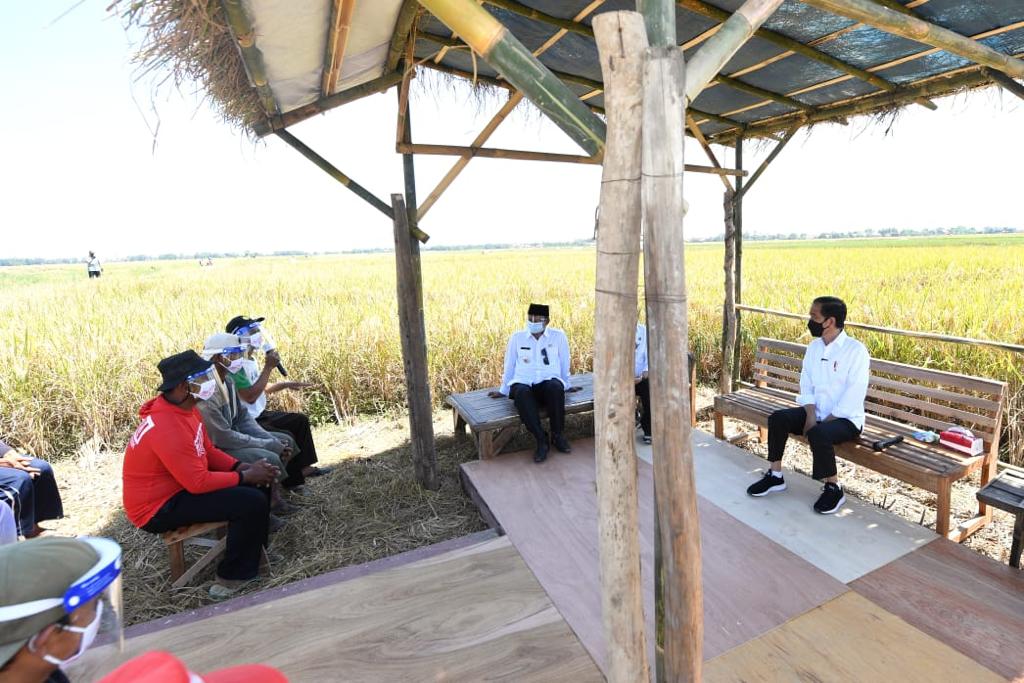No Rice Imports, VAT on Staple Food, Minister Says

Accompanied by Agriculture Minister and Managing Director of the State Logistics Agency, President Jokowi holds a dialogue with farmers in Indramayu, West Java (Photo by: Press Media and Information Bureau of Presidential Secretariat/Lukas)
Amid the current pandemic situation, the Government has underscored it will not import rice as national rice supply is adequate, adding that it will also not impose a value-added tax (VAT) over staple food consumed by the public.
There is no rice imports and value-added tax on staple food. We must not make farmers worried Minister of Agriculture Syahrul Yasin Limpo said, Thursday (8/9/2021).
The Minister also stressed the Presidents directive that the Government will not import rice.
“President Jokowi has firmly said that there is no rice import. The Government has never discussed the plan of rice imports and the increase in staple food VAT,” the Minister added.
Syahrul went on to say that there are four reasons not to import rice.
First, As of now, Indonesia, he said, has adequate rice supply secured by the State Logistics Agency (Bulog), rice milling units, and local governments.
According to Syahrul, rice production during the 1st planting season this year reached 17.56 million tons and a surplus amounting to 7.39 million tons was in January 2020, while the total national consumption reaching 14.67 million tons.
Therefore, until the end of June 2021, a surplus of 10.29 million tons of rice was reported.
“Almost every week, the President checked the supply online. President Jokowi ordered that food control for national needs be fully under the control of several ministers in order to control it well,” Syahrul added.
Second, Indonesia has entered the 2nd planting season this year and the harvest yield in the middle of the year is likely to increase national food supply.
The Ministry, he added, has also set a target the rice production during the 2nd planting season that reached 14.25 million tons with a rice surplus of 10.29 million tons, while national rice consumption reached 14.91 million tons, so that by the end of December 2021 there will be an estimated surplus of rice supply amounting to 9.63 million tons.
Third, Bulog currently has rice supply as the Governments rice reserves amounting to 1.37 million tons, which means it is above the safe limit of 1 million tons, he added.
Moreover, there is also commercial rice supply amounting to 13,969 tons. Every month, 80 thousand tons of rice are distributed to keep the price and the supply stable, and to fulfil needs in times of disasters. With this amount, national rice supply will be secure until the end of the year, the Minister added.
According to Syahrul, national rice consumption remains high because most people consume rice.
Therefore, he said Ministry of Agriculture is firmly committed to ensuring the availability of rice and other basic foodstuffs through a number of production improvement programs, one of which is five ways of acting as measures to provide food and rebuild the economy.
With the program, the Ministry, he added, has been successful in improving production capacity through crop intensification, swampland and dryland development, crop index improvement optimization, agricultural machine facilitation, and infrastructure improvement.
“In addition, the Government also provides agricultural financing assistance as an effort to maintain production and welfare of farmers. This assistance is given through Peoples Business Credit (KUR) funds with only a six-percent interest. The total amount of KUR this year is Rp70 trillion and only Rp26 trillion has been absorbed. We encourage farmers to optimize this loan so that we can continue to advance our agriculture sector,” he remarked.
For the record, report from the Statistics Indonesia (BPS) shows that amid the COVID-19 pandemic, in the the growth of Indonesias Gross Domestic Product, only agricultural sector recorded a significant increase at 16.4 percent. (PR of Ministry of Agriculture/UN) (AP/EP)








